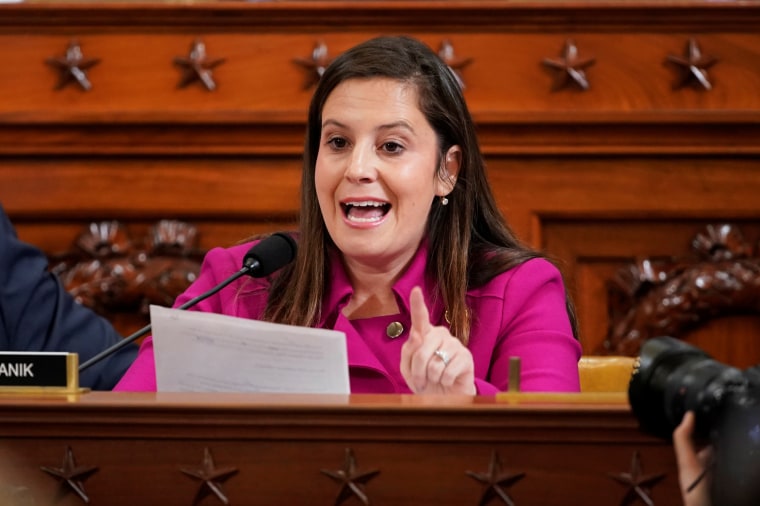As the House Republican Conference prepares to purge Rep. Liz Cheney (R-Wyo.) from the GOP leadership, Rep. Elise Stefanik (R-N.Y.) has invested a fair amount of time raising her profile, including multiple interviews with conservative outlets. Yesterday, the New York Republican spoke to the Washington Examiner, which posed a straightforward question.
"Do you agree with Trump that Biden was illegitimately elected and the election was stolen?" the Examiner asked. Stefanik replied, "President Biden is president," which is a lazy way of dodging a question that responsible officials shouldn't dodge. She went on to elaborate a bit on the subject:
"I have said that there are election irregularities and an unconstitutional overreach, which is why I objected to certain states. You can refer to my statement on the House floor. I fully stand by that, and voters support the focus on those issues. But the irregularity, the unconstitutional overreach, the lack of ballot security, those are important issues that the American people want to hear solutions from the Republicans on."
From a reality-based perspective, Stefanik's entire pitch is a mess -- or more to the point, her latest mess related to the 2020 presidential election. She began yesterday by hedging a simple question, before peddling obvious nonsense about "irregularities" and "ballot security" questions that only exist in the imaginations of far-right conspiracy theorists, before pointing to her Jan. 6 statement that she "fully" stands by.
The problem, of course, is that the congresswoman's Jan. 6 statement was littered with demonstrable falsehoods.
It's part of an unfortunate pattern: as we discussed last week, Stefanik apparently believes the easiest way to climb the Republican ladder is to peddle discredited claims about the 2020 election and express support for the utterly bonkers "audit" in Arizona.
Sen. Susan Collins (R-Maine), arguably the Senate's most centrist Republican, seemed to take some solace yesterday in the fact that Stefanik "has a more moderate voting record." There's some truth to that: the New York Republican started her career as a relative moderate, at least by contemporary GOP standards. Stefanik even voted against some key elements of Donald Trump's agenda, including the party's 2017 tax breaks for the wealthy and big corporations.
But the point driven home by the Cheney-vs-Stefanik drama is the degree to which Republicans don't care about policy. (Insert obligatory reference to my book here.) To get ahead, Stefanik has abandoned her earlier persona, become a Trump acolyte, and no longer offers direct answers to easy questions such as, "Was Biden's election legitimate?"
The Washington Post's Marc Thiessen -- a columnist I consider the newspaper's most reflexive Republican partisan -- wrote in his latest column:
[Stefanik] voted against Trump's singular legislative achievement — his 2017 tax reform bill — and against making his tax cuts permanent. She voted to block Trump from withdrawing from the Paris climate accords. She voted to condemn Trump for calling on the courts to invalidate the Affordable Care Act. She voted to overturn Trump's emergency declaration at the southern border so he could fund the border wall, and then voted to override Trump's veto of a bill that reversed his emergency declaration. Trump calls Cheney a "warmongering fool" who wants to "fight ridiculous, endless wars," but Stefanik voted with Cheney to oppose Trump's withdrawal of U.S. forces from Syria.
Thiessen added, "Cheney has a far better record of supporting the Trump agenda than Stefanik does."
With records like these, one might assume that relentlessly partisan, far-right Republicans would see Cheney as an ally and Stefanik as an unreliable RINO in need of a primary rival.
But as we're seeing in unfolding events, that's backwards -- because relentlessly partisan, far-right Republicans don't much care about policy. Trump and his forces care about loyalty to him personally and a willingness to commit to his twisted vision and conspiracy theories.
Stefanik is passing their tests; Cheney is not. The former will soon get a promotion; the latter is being purged for having the audacity to tell the truth about the value of democracy.

